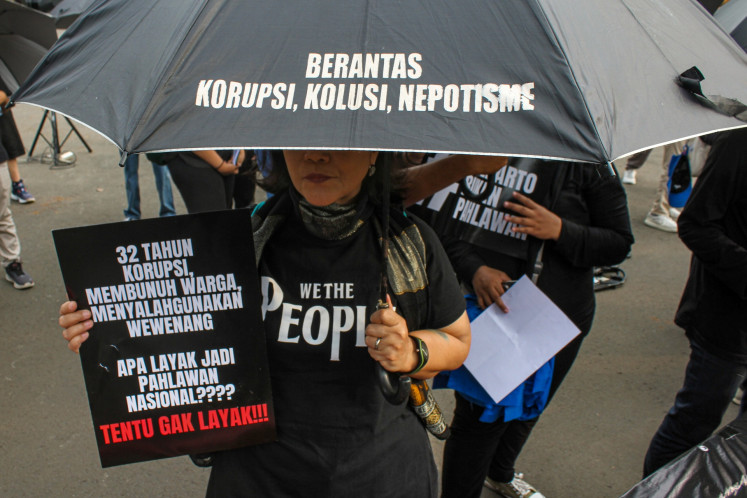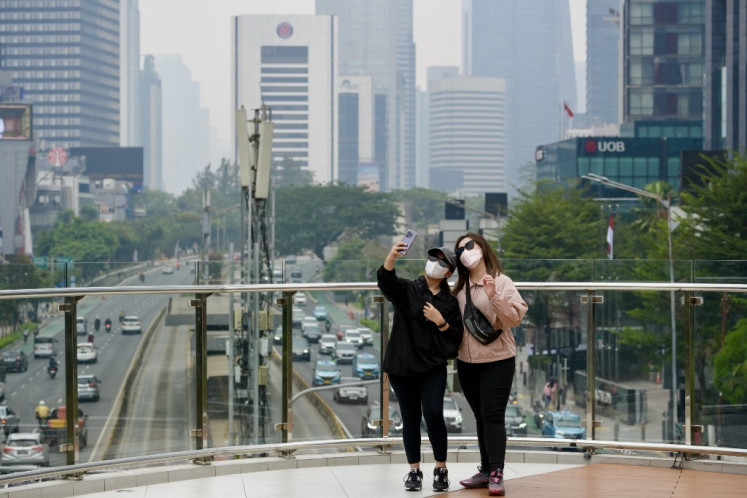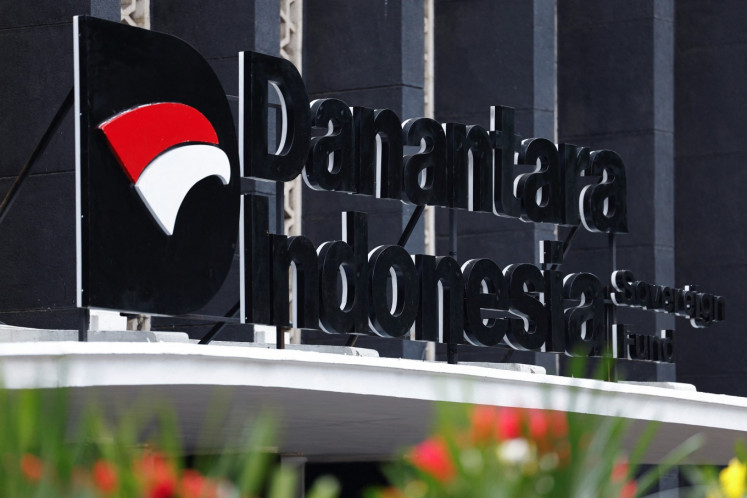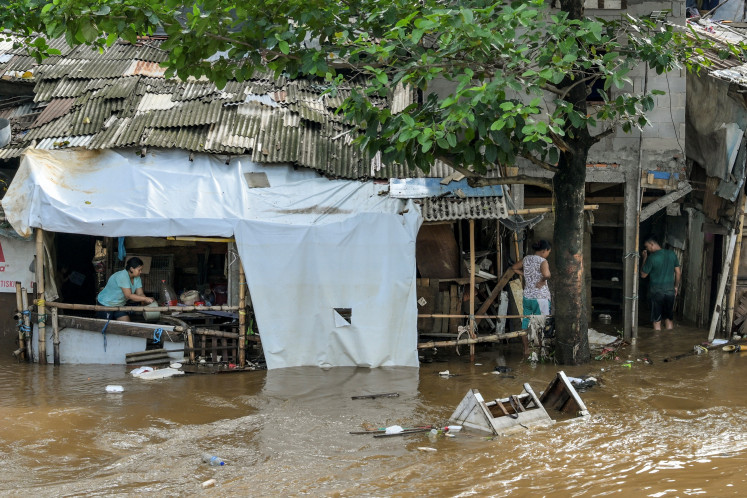Popular Reads
Top Results
Can't find what you're looking for?
View all search resultsPopular Reads
Top Results
Can't find what you're looking for?
View all search resultsGlobal pandemic needs local solutions for sustainable food systems
This pandemic is forcing us to look inward and search for local solutions to our food security problems.
Change text size
Gift Premium Articles
to Anyone
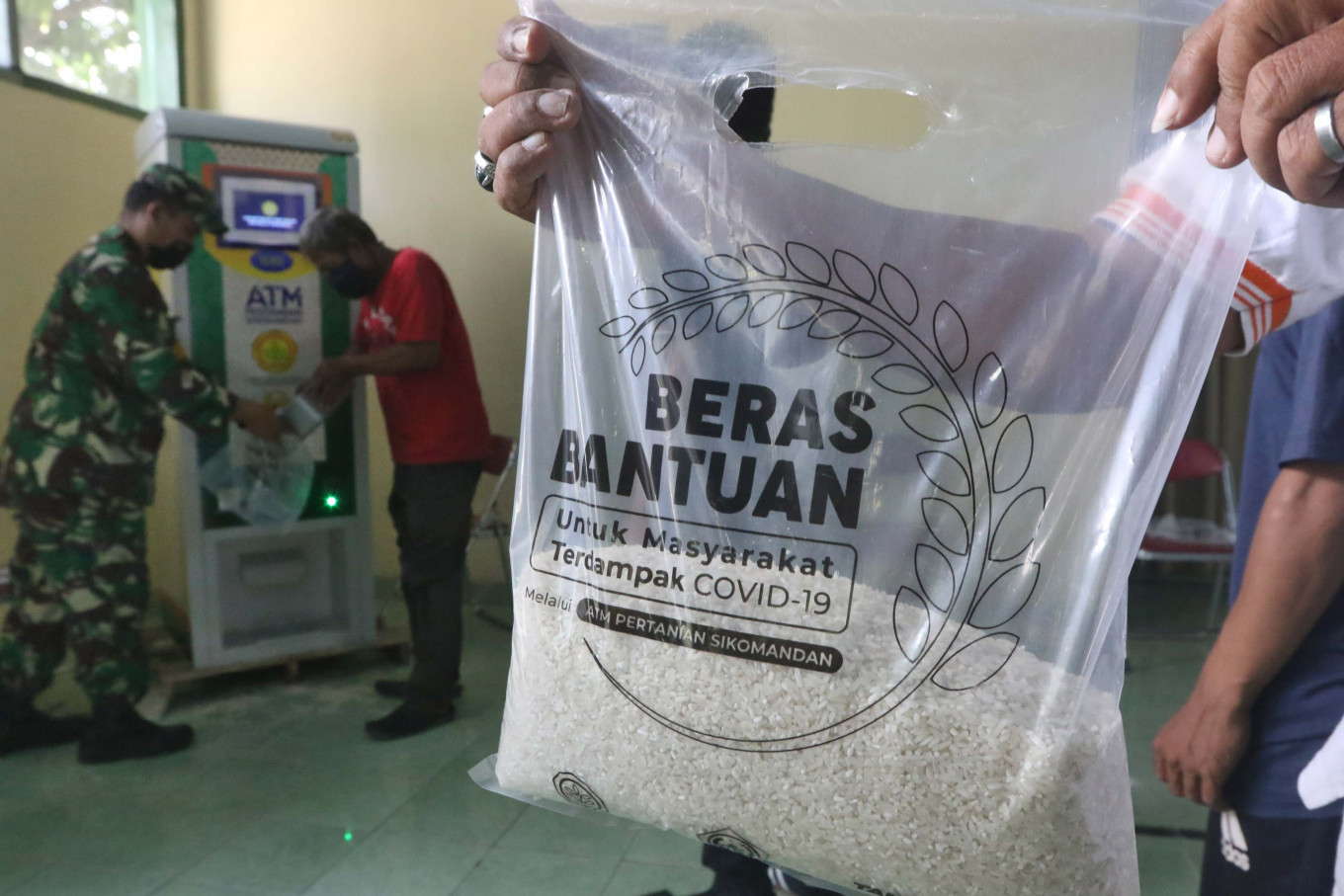 Bagged up: A recipient shows free rice from the Agriculture Commander ATM at the South Jakarta Military District Command on Monday. The government, through the Agriculture Ministry, is distributing free rice to help people badly affected by the COVID-19 outbreak in Greater Jakarta. (JP/Dhoni Setiawan)
Bagged up: A recipient shows free rice from the Agriculture Commander ATM at the South Jakarta Military District Command on Monday. The government, through the Agriculture Ministry, is distributing free rice to help people badly affected by the COVID-19 outbreak in Greater Jakarta. (JP/Dhoni Setiawan)
T
he COVID-19 pandemic has created disruption in our food systems. The decades of effort to homogenize Indonesian food systems has made our food security vulnerable to supply shocks. The global pandemic needs local solutions that take full account of the potential diversity of Indonesia's food systems. Policymakers must put cluster-based value chains into practice, support initiatives promoting food systems resilience, harmonize food system issues from agriculture to health, while promoting more diversified diets to the public.
Since Indonesia’s first confirmed case of COVID-19, there have been episodes of panic-buying and panic-selling. Such panic potentially contributes additional food waste. The large-scale social restrictions (PSBB) have naturally forced businesses to more geographically clustered food supply and distribution channels.
To some, the pandemic stimulates more digital platforms that allow transactions with less contact among those involved. But many stakeholders in our food systems, especially small-scale food producers, are not prepared for such transformations. Rapid assessment conducted by EntreVA and AGRILogics showed that most food chain stakeholders are aware of the disruption but few are ready to adjust their business practices.
With more than 17,000 islands and a population exceeding a quarter billion people, Indonesia’s food system comprises multiple overlapping and distinct systems. In the past, diets in one region could be very different from another, depending on the different local natural resources and food cultures. But for decades, agriculture policy and the food industry have been focusing on only a few types of plants and animal species.
Consequently, most farming resources are used only for these commodities. This type of intensive monoculture-based food production may have produced more staple crops, but it has also destroyed biodiversity. This leads us to dietary transitions away from local foods, toward homogenous foods.
When people no longer consume local foods, and are heavily dependent on imported foods, their food systems are less resilient to supply shocks. The pandemic has made us aware of the fragility of our food system, with national dependence on a single staple, and heavily imported food items. Jakarta dwellers remember the race for sugar in March that led to 130,000 tons of sugar imported from India. In Papua, lockdown has the local government worried, what will happen when national rice production is not sufficient? While the traditional staple foods in Papua are sago and tubers, now 75 percent of Papuans are rice dependent. Despite years of the national paddy field printing program in the province, there is very little production of rice in Papua where most of the land is not suitable for growing rice.
In addressing food security and nutrition problems, we tend to use a predominantly medicalized approach by tackling specific nutrient deficiencies on their own. Such an approach disconnects nutrition from food as the very source of nutrients, and from the whole food systems, in which agriculture and health are interlinked. Fortification and supplementation programs have been implemented for years, but those alone cannot solve the country’s malnutrition problem.
Logistics and transportation in the distribution of the fortified food and supplements to various places in the archipelago are frequent obstacles to this nutrition strategy. Regional lockdowns, with national rice shortage and imported fortificants, make this strategy even less suitable during the pandemic.
So what strategy should we prioritize?
This pandemic is forcing us to look inward and search for local solutions to our food security problems. The mega-diversity of our food systems has been marginalized in national food security strategies. Indonesians need to take charge over our own solutions for sustainable food systems that promote resilience, and are respectful of the diversity of our food cultures and environment. This means that national policies to assure food security in Indonesia should not be homogenized across regions. Instead, we should consider local natural resources, agricultural suitability and cultures.
We suggest that the government prioritize the following strategy to respond to food system disruption:
First, prioritize cluster-based approach in managing supply chains during and beyond pandemics. Cluster-based supply chains prioritize supply and demand within geographical coverage and sharing resources within clusters. It also stimulates farmers to cultivate indigenous species for local consumption, and market the surplus to neighboring markets through collaboration between clusters.
Cluster-based supply chains is a suitable approach for an archipelagic nation like Indonesia, where traditional diets are diverse in different locations. It promotes food systems resilience during pandemics and beyond.
Second, collaborate with all food stakeholders, to further identify and stimulate local initiatives that support food resilience, during and beyond this pandemic. Many small-scale farmers and fishers are not ready to shift their business practices. They need assistance to aggregate demand, provide and process supply-demand data, and to dynamically respond to pandemics by shifting their commodities when the market needs it.
Some examples of such initiatives are spread around the country; Kampung Organik Brenjonk in Mojokerto supports homestead agriculture, and facilitates product distribution for the East Java market. In Garut, West Java, the Ath-Thariq farming community develops local food products, trains local youth farmers, and markets the products around the province. Krayan farming communities in North Kalimantan cultivates indigenous rice and vegetables species, prioritize in supplying local demand before marketing outside the province. The 1000kebun.org initiative stimulates regular people to farm, aiming to create better access to healthy foods from our own environment. OkeJeck in Papua helps the marketing of vegetables and fruits cultivated by women farmers living in forested areas using online platforms. The government needs to further identify, and work with local initiatives like these to stimulate activities that promote food systems resilience.
Third, lead the harmonization process of the food system, from issues related to food production to health and nutrition. Government bodies dealing with these issues need to be organized with better collaboration, and see food issues as part of an interlinked system.
Fourth, support and facilitate nutritionists, agriculturalists, civil societies, and non-government stakeholders to campaign for more diversified diets. Cutting back on rice and sugar consumption has been advised by nutritionists and health experts long before the pandemic. Increased consumption of non-rice staple foods such as sago and tubers, and underutilized local vegetables such as ferns, moringa, velvet leaf and small undervalued fish, are suggested for human and planetary health. These practices are even more crucial during pandemics.
Experts who have analyzed the COVID-19 pandemic claim that it will affect the world economy for many years to come. The government should harness the momentum of this heightened attention and shocks in the food value chain, to work toward improvements that touch the core of our food systems.
***
Mulia Nurhasan is a research associate of sustainable food systems at the Center for International Forestry Research (CIFOR), M. Hariyadi Setiawan is chief enabler officer at EntreVA, Miranda is project manager in Green Food division at HIVOS Southeast Asia.




